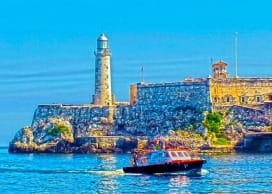
Havana ephemeris. 11 of September.
1875. Father Carlos Benito Viñes Martorell issues the first tropical cyclone warning in Cuba.
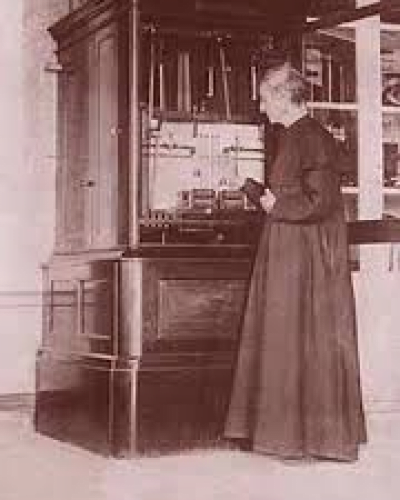
It was published the following day in the publication La Voz de Cuba and in addition to pointing out the immediate danger to Havanans, in his text the Jesuit priest also predicted for the first time the probable trajectory of a cyclonic organism in Cuba.
The hurricane finally hit Havana on September 14. This event is considered the first for meteorology in the country.
In response to his outstanding results in his work, he was elected in 1873 a Member of Merit of the Royal Academy of Sciences of Havana.
1876. Antonio María Romeu was born in the area of Jibacoa, Santa Cruz del Norte, then province of Havana.
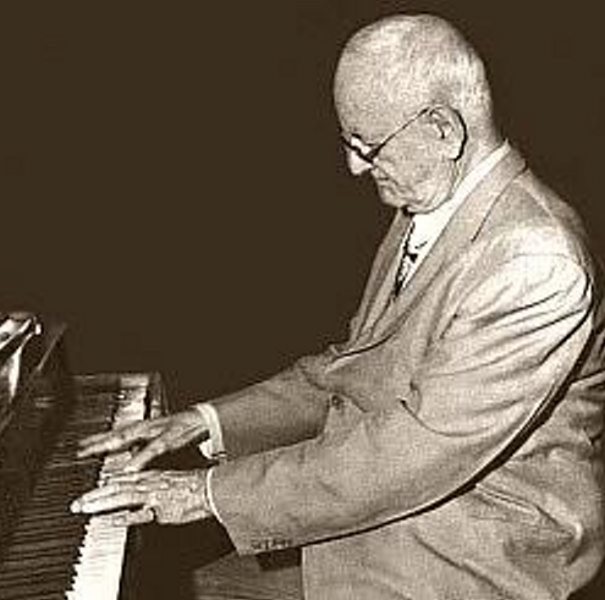
From his childhood stage he began his musical studies with the parish priest of his hometown. At the age of 11 he played for the first time at a dance in the town of Aguacate near his place of residence.
At age twelve he wrote his first musical composition, a Mazurka.
At the age of 22, exactly on January 22, 1899, he arrived in Havana hired to play at the La Diana cafe and very soon established himself as the best pianist of the moment.
As a composer he created hundreds of danzones. His works present a perfect quadrature, a richness of melodic and Creole content. He came to be described as the "Wizard of the Keys" for his virtue when playing the piano.
His death occurred in Havana on January 18, 1955.
1911. Ignacio Jacinto Villa Fernández is born in the town of Guanabacoa, in Havana.

His relationship with music began to materialize in 1921 at the Guanabacoa Music School and Band, under the tutelage of maestro Gerardo Guanche.
Years later known by the pseudonym Bola de Nieve, he became an exceptional performer, prolific composer and great pianist. More than singing, he had a specific way of saying, of whispering, of transferring his most intimate motivations to an audience through musical creations.
He performed for several years at the Monseigneur restaurant, beginning with its reopening in 1965. With his inseparable tailcoat, every night he offered his guests his art and good humor.
He passed away in Mexico on October 2, 1971.
1942. Eusebio Leal is born in Havana.
He was through time a prominent intellectual and historian of Havana. A large part of the rescue work carried out in the historic center of the Cuban capital is due to his efforts and work. He was part of the Cuban Parliament as a deputy. For his life's work he was the subject of numerous awards both in Cuba and in various countries.
He wrote essays, prologues and articles on Cuban History, aspects related to Havana, American issues, restoration and museology that have been published in Cuba and abroad.
His death occurred in the Cuban capital on July 31, 2020.
1954. The prominent Cuban poet Emilio Ballagas dies in Havana.
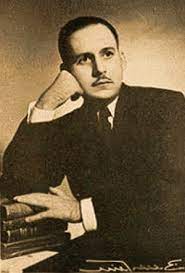
He was born in Camagüey on November 7, 1908. His first book of poetry was published in 1931, when he was 23 years old. This book was titled Jubilo y Fuga.
Regarding his work as a poet, he once stated: “Poetry in me is not a job or a benefit. It is a humble discipline, a human fact that I cannot refuse, because it calls me with the most tender of voices, with an unmistakable pleading and imperative voice at the same time. As a poet I do not feel in any way an exceptional and privileged being”.
2000. Percussionist Pedro Izquierdo Padrón, known in the artistic world as Pello el Afrokán, dies in Havana.
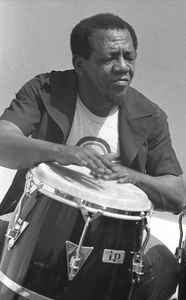
Born on January 7, 1933, in the Jesús María neighborhood, in Havana, from his childhood stage he came into contact with music. He was only 12 years old when he appeared at the Martí Theater with his brothers Gilberto and Roberto. Several decades later, his name reached national and international notoriety when he created a group composed essentially of percussion and wind instruments. It was then that he conceived the rhythm called Mozambique. He chose that name to pay homage to one of the fundamental roots of Cuban music from African territory.
2009. The Commander of the Revolution Juan Almeida Bosque dies in Havana.
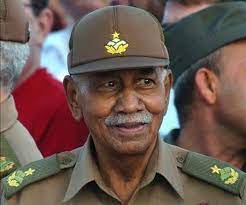
His birth took place in Havana on February 17, 1928 in a humble family.
On July 26, 1953, he was part of the group of young revolutionaries who, under the leadership of Fidel Castro, carried out the assault on the Moncada barracks in Santiago de Cuba. Months later, after being tried and sentenced for his participation in that action, he was interned in the Model Prison on the Isle of Pines.
After leaving the prison, he traveled to Mexico and from that country on November 25, 1956, in the company of Fidel and other combatants, he left for Cuba aboard the Granma yacht. He then participates actively and decisively in the revolutionary struggle in the territory of the Sierra Maestra for almost two years and reaches the rank of Commander.
Starting in 1959 with the triumph of the Revolution, he held various responsibilities, first within the Rebel Army and the Armed Forces. He was also a party and government leader. He was a member of the Political Bureau of the Central Committee of the Party and Vice President of the Council of State. He was President of the Association of Combatants of the Cuban Revolution.
He also provided his contribution to the development of Cuban culture. He wrote several books and composed various musical creations. As a composer he sang to people, to love, to everyday life and to the heroic deeds of human beings.